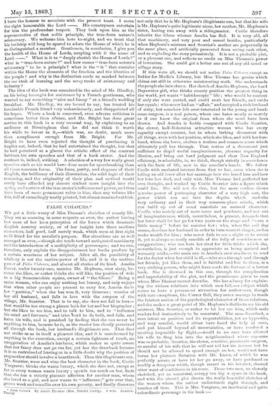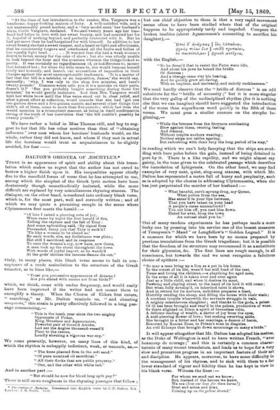FALSE COLOURS.* We get a little weary of Miss Thomas's
sketches of county life. They are as amusing in some respects as ever, the author having lost none of her keen perception of the forces which dominate English country society, or of her insight into those medium characters, half good, half merely weak, which seem at first sight so ill fitted for the novelist's purpose. Her situations are as well arranged as ever,—though she tends toward antiquated machinery and the introduction of a multiplicity of personages ; and we can, therefore, only explain the disappointment her books produce by a certain weariness of her subject. After all, the possibility of adultery is not the motive-power of life, and it is the motivepower of False Colours, and almost all stories of its kind. Amelia Foster, under twenty-one, marries Mr. Hepburn, over sixty, because she likes, or rather thinks she will like, the position of wife to a big Somersetshire squire, owner of "the Glene." Being a mean woman, who can enjoy nothing but luxury, and only enjoys that when other people are present to envy her, Amelia finds her "position," when she has won it, very tiresome ; wearies of her old husband, and falls in love with the surgeon of the village, Mr. Scorner. That is to say, she does not fall in love— that would be too strong a phrase both for her and her biographer ; but she likes to see him, and to talk to him, and to "influence his mind and fortunes," and tries hard to do both, and fails, and hates his wife, and is punished by finding that she can never be anything to him, because he is, as the reader has clearly perceived all through the book, her husband's illegitimate son. That does not strike us as in itself a pleasant idea, and it is unredeemed by anything in the execution, except a certain lightness of touch, an exaggeration of Amelia's hardness, which makes us quite aware that her fancy does not go too far, yet has the drawback because it is so restrained of leaving us in a little doubt why the position of stepmother should involve a heartbreak. Then this illegitimate son, Mr. Scorner, woos and wins the best character in the book, Cecile argrave ; thinks she wants luxury, which she does not, except so far as every woman wants luxury ; spends too much on her, finds that she has a strictly platonic affection for another man, whom she loved as a girl, and now wants to " influence ;" gets over that, grows weak and maudlin over his own poverty, and finally discovers
False Colours By Annie Thomas (Mrs. render Crallip). 3 vols. London: Tinsley
not only that he is Mr. Hepburn's illegitimate son, but that his wife is Mr. Hepburn's quite legitimate niece, her mother, Mr. Hepburn's sister, having run away with a ridingmaster. Cecile therefore iuherita the Glene whence Amelia has fled. It is very old, all that machinery, and very poor and unreal besides, particularly when Hepburn's mistress and Scorrier's mother are perpetually in the same place, and artificially prevented from seeing each other, and so exploding the story prematurely. It is not a probable plot, or a pleasant one, and reflects no credit on Miss Thomas's power of invention. She could get a better one out of any old novel or village story.
If this were all, we should not notice False Colours except as fodder for Mudie's Library, but Miss Thomas has genius which shines out still in otherwise uninteresting work. She understands the people she introduces. Her sketch of Amelia Hepburn, the hard Bayswater girl, who thinks county position the greatest thing in the world, yet wants " kaleidoscopic" life ; who would be content if only she were envied, and could snub her friends, and outdo her equals ; who never had an "affair," and accepted a rich husband of sixty, but somehow felt over-interested in the young and handsome surgeon, is a real person, whom one hates nearly as acutely as if one knew the original from whom she must have been drawn. And Amelia is feeble compared with Cecile Scorner, the clever, half-Bohemian attractive woman who has every capacity except content, but in whom lurking discontent with all things, even with her position, which she likes, and with her husband, whom she loves, evolves a realism and common-sense which ultimately pull her through. That notion of a discontent just sufficient to dispel useful imaginativeness, pleasant capacity for illusion, and bring out hard judgment and clear New England efficiency, is admirable, is, we think, though strictly in accordance with the facts of life, now in the novelist's hands. We follow Cecile with unabated interest from first to last, even when she is telling an old lover after her marriage how she loved him and how her love has died, and only wish Miss Thomas had perfected her own thought, and worked up Cecile Scorner into a figure which could live. She will not do that, but the mere outline shows genuine power of portraying character of a very high sort, the power which can see into the depths which underlie very ordinary and in their way common-place inhale, which can build up out of usual materials an unusual character. Cecile, who mainly out of mere sense and prudence, and not out of imaginativeness, which, nevertheless, is present, demands that. her lover shall let her go for two years on the stage and "earn a little money" before he marries her ; who, when the evil day comes, deceives her husband in order to turn concert-singer, and so make wealth for him ; who never fails to see a slight or to resent it, yet is always so coolly sensible of the folly of sensitiveness or exaggeration ; who can hate her rival for little tricks which she, nevertheless, is just enough to appreciate as being natural and womanly trielcs,—the main one is Amelia's over-readiness to send for the doctor when her child is ill,—who sees through and through her friends, yet likes them, and is faithful and fair to them, is a very striking person, who might have made the fortune of a better book. She is drowned in this one, through the complication and improbability of the plot, and the prominence given to men whom Miss Thomas cannot describe. She has a fancy for explaining the vicious relations into which men fall, —a subject which seems to have a permanent attraction for authoresses, though with rare exceptions, like Currer Bell, they never manage to reach the faintest notion of the psychological character of those relations, and she makes a great point of Mr. Hepburn's dislike to see his old mistress, Mrs. Scorner, or rather to let her see him, which male readers feel instinctively to be unnatural. The man described, a man intent on position and its respectabilities, yet no hypocrite, and very manful, would either have faced the lady at once, and put himself beyond all uncertainties, or have rendered a meeting impossible by flight,—would in no case have allowed his wife to drag him into the neighbourhood wlwre exposure was so probable. Scorner, the clever, sensitive, passionate surgeon, so careful of his wife that he will not tell her his income lest he should not be allowed to spend enough on her, would not have borne her platonic flirtation with Mr. Lister, of which he was perfectly aware, or have let her go away, or have pardoned so readily a deception which, though meant in his interest, showed utter want of confidence in his sense. These two men, so cleverly sketched, yet so unnatural, occupy too big a space in the book, and with the absurd plot drown the really beautiful sketches of the women whom the author understands right through, and touches off thus. This is Mrs. Vargrave, an incidental and quite subordinate personage in the book :—
"At the time of her introduction to the reader, Mrs. Vargrave was a handsome, happy-looking matron of forty. A well-satisfied wife, and a not unreasonably proud mother, and a 'very model aunt,' her husband's niece, Cecile Vargrave, declared. Two-and-twenty years ago her hutsband had fallen in love with her sweet beauty, and had married her for it, hopeful of nothing beyond, and perfectly contented with it. But he had got more than he had bargained for with himself. In addition to her sweet beauty she had a sweet temper, and a heart so light and affectionate, that he consistently forgave and overlooked all the faults and follies of
her equally light head It was not that she had a weak woman's desire to lavish money for the sake of show ; but she was utterly unable to look beyond the hour and the counters whereon the things looked so pretty. It was certainly no regardleasness of, or indifference to, money that actuated her ; for when the bills came in, she would bemoan herself freely and honestly, and launch out accusations of imposition in their charges against the most unexceptionable tradesmen. ' It is a matter of fact that the bill is a mistake, or an imposition, James,' she would say, earnestly; why, I was only in the shop five minutes, and here's twenty pounds! Common-sense tells you it is a mistake on their parts, doesn't it?' 'But you probably bought something during those five minutes,' he would gently insinuate. And then Mrs. Vargrave would knit her white brow until the blue veins stood out in clear relief, and after a great effort at reflection, would concede that she had 'got one ten-guinea dress and a five-guinea mantle, and several other things that didn't, all of them, come to more than five pounds ; which last item she would mention in a triumphant manner, as being in itself confirmation strong of the truth of her conviction that the bill couldn't possibly be twenty pounds.'"
We have rather a belief in Miss Thomas still, and beg to suggest to her that life has other motives than that of "obtaining influence" over men whom her heroines' husbands would, on the whole, rather they did not know, and whom if they met in actual life the heroines would treat as acquaintances to be slightly avoided, for fear —































 Previous page
Previous page